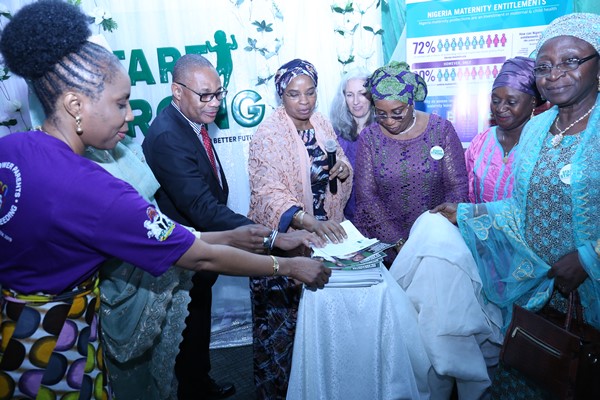
As part of the activities to mark the 2019 World Breastfeeding Week celebrated from 1st to 7th August of every year, the Federal Ministry of Health in collaboration with relevant stakeholders have launched the National Zero Water Campaign with the slogan ‘Zero Water, Exclusive Breastfeeding for Better Future’.
The aim of the campaign is to highlight the importance of breast-milk and the need to discourage prelacteal feeding which puts babies at risk of malnutrition and other illnesses such as diarrhea.
Speaking at the launch, in Abuja, the Wife of the President, Mrs. Aisha Buhari, who was represented by the wife of the former Governor of Nassarawa State, Dr. Mairo Al-Makura, said that the launch of the Zero Water Campaign would change the narratives of Nutrition in Nigeria. It would also impact on the health status of the country which ultimately would contribute largely to her economic growth and development.
The Wife of the President noted that there were lots of benefits from Exclusive Breastfeeding, for the mother, child, family, community and indeed the nation. She stated that Breastfeeding specifically contributes to the health and well-being of mother and child, helps in child spacing and reduces the risk of ovarian and breast cancer.
While Exclusive Breastfeeding is the most secure way of infant feeding, Mrs. Aisha Buhari regretted that non-breastfeeding comes with a huge cost which must not be allowed to continue. She noted that it reduced infant mortality caused by common childhood diseases like diarrhea and pneumonia; as such, ‘We cannot continue to lose our children when we can prevent such deaths using a simple cost-effective method of mothers exclusively breastfeeding their children in the first six months of life’.
Mrs. Buhari, who also is the President of “Aisha foundation’’, affirmed her commitment to align with all relevant stakeholders to ensure effective implementation of Zero Water Campaign through her pet project, known as the ‘Future Assured Programme’.
Earlier, the Permanent Secretary, Federal Ministry of Health, Mr. Abdulaziz M. Abdullahi, quoting from the National Nutrition and Health Survey 2018 (NNHS) said that almost 97% of children were breastfed at one time or the other but the biggest challenge to exclusive breastfeeding was that many of those children were given water or complementary foods within first six months of life.
To correct this practice therefore, the Federal Ministry of Health in collaboration with partners developed the National Zero Water campaign to draw the attention of the community, households and caregivers to the importance of early initiation and exclusive breastfeeding.
The Campaign, according to Abdullahi, is designed to harness the potential of different social mobilization strategies as articulated in the National Social and Behavioral Change Communication Strategy (SBCC) for infant and young child feeding which was launched by Wife of the President in 2017.
Mr. Abdullahi represented by the Director, Health Planning Research and Statistics, Dr. Emmanuel Meribole, stated that the campaign would target not only the mothers and caregivers but other members of the household and communities including father/husbands grandmothers, communities/religious leaders, government officials, the private sector and Civil Society Organizations.
He assured that at the end of the two year campaign, along with other intervention programs like Accelerating Nutrition Results in Nigeria (ANRIN) Project, and the Future Assured Programme, ‘the breastfeeding indices will improve tremendously and ultimately contribute to reduction of stunting in Nigeria’.
Also speaking, the Permanent Secretary, Federal Ministry of Budget and Planning, Mr. Ernest Umakhihe, represented by the Deputy Director, Food and Nutrition, Mrs. Chito Nelson, informed that the Ministry had put machineries in place to ensure that children are exclusively breastfed without any additions of water or liquid for the first six months. This, he said was being done through continuous advocacy for provision of funds for: the establishment of crèches at work places; extended maternity leave and code for the marketing of Breast milk substitutes.
He assured of the Ministry’s advocacy for more funds to implement all nutrition activities and policies at the States and Local Government levels.
The Director General, Nigeria Governors’ Forum, Asishana Okauru, said that the forum which serves as a catalyst to government policies has made improving nutrition in their member States a top priority. He added that members were encouraged to meet set targets in order to improve on their health indices.
In this regards, he disclosed that the Secretariat is compelling States to comply, as score cards would be deployed to promote accountability and healthy competition.
The United Nations International Children’s Education Fund (UNICEF), Representative, Pernille Ironside, said that for high impact social behavioral change in families, there is the need for intensive communication and counselling. She also underlined that improved and increased investment at community levels and operationalisation of marketing is of great essence.
In his remarks, the Senior Programme officer, Bill and Melinda Gates Foundation, Dr. Victor Ajieroh, reiterated the Abuja Breastfeeding Declaration of April 2016 which highlighted supporting women with a six months fully paid maternity leave to enable them initiate breastfeeding immediately after birth and breastfeed exclusively for the first 6months.
According to him, ‘As a Government that is keen on investing in its people, this support is one of the smartest investments that can be implemented’. He emphasized that supporting optimum breastfeeding is key to improving health and building the brainpower that can support effective education and development of a productive workforce.
He therefore urged the Private sector to ensure that no brand that positions itself to advance nutrition undermines the practice of optimum breastfeeding. ‘Advancing the cause of optimal breastfeeding will require sacrifice from every one. The challenges are real but it is an investment worth it’, he opined.
Some of the Objectives of the Campaign include: To Increase the proportion of infants put to breast-milk within an hour at birth; Increase the proportion of infants exclusively breastfed for six months and create enabling and supportive environment for the promotion of exclusive breastfeeding, amongst other.
Highlight of the occasion was a presentation on National Maternity Entitlement Survey Findings; a joint project of the Federal Ministry of Health and Partners to assess how to achieve breastfeeding among working mothers and the awareness that the workers have in public and private sector. The Survey also sought to know the readiness of States to adopt the lactation policy.
Ogundoro Modupe (Mrs)
DD/Media and Public Relations




